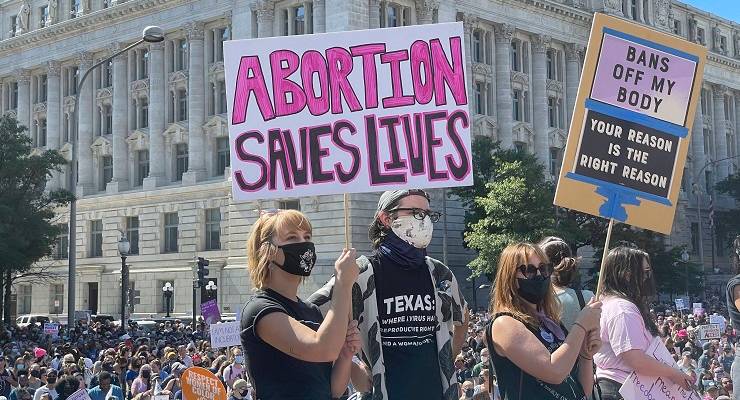
JULIE RIKELMAN FOR JACKSON WOMEN’S HEALTH, THE LAST ABORTION CLINIC IN MISSISSIPPI: …And, in fact, the data has been very clear over the last 50 years that abortion has been critical to women’s equal participation in society. It’s been critical to their health, to their lives, their ability to pursue-“
CHIEF JUSTICE JOHN ROBERTS OF THE US SUPREME COURT: I’m sorry, what — what kind of data is that?
MS RIKELMAN: I would refer the Court to the brief of the economists in this case [that] compiles data showing studies based actually on causal inference, showing that it’s the legalisation of abortion and not other changes that have had these benefits for women in society, and, again, those benefits are clear for education, for the ability to pursue a profession, for the ability to have-
CHIEF JUSTICE ROBERTS: Well, putting that data aside…
The demise of Roe v Wade is nigh. In oral argument before the Supreme Court less than a fortnight ago, lawyers for the Jackson Women’s Health clinic did all they could to interest the justices of the US Supreme Court in the data that had been painstakingly assembled by 154 economists — including recent Nobel Prize winners David Card, Joshua Angrist, and Guido Imbens — that proved legal abortion was critical to women’s advancement towards equality with men.
Whether through the reduction of teenager motherhood by 34%, maternal mortality for Black women by between 30-40%, or improvements in women’s education, labor force participation, occupational prestige and earnings, legal abortion is critical to women’s ability to “act in society” and “participate equally in the economic and social life of the nation”.
Defenders of legal abortion had good reason to think the court would care about such evidence. For one, the words in quotes above come from the court’s own past decisions about why Roe v Wade should stand, although critics claimed they lacked evidential backing. But in a classic bait and switch, now that the evidence is in, anti-choice justices no longer care.
This is not surprising to anyone who understands what drives anti-choice advocates, including those comprising the super-majority on the court. While eminent legal scholars and commentators have labelled the court’s indifference to the negative impact of unlawful abortion on women’s lives as “super weird”, “strange” and “bizarre,” they should know better. Sociologists and social psychologists have been demonstrating why this is a feature of the movement — not a bug — for close to 40 years.
Let’s start with Kristin Luker’s The Politics of Motherhood. In her ground-breaking interviews with pro- and anti-choice activists, Luker learned that the moral position women took on fetal life was reflective of their social class and, relatedly, view of marriage, motherhood and the proper place of women in contemporary society.
My own research, published for a general audience in The Abortion Myth, validated such findings for Australian women connected to the right-to-life movement in Melbourne. Again, pro-life women were clear that changes to women’s roles in society were what animated their anti-choice views. For them, legal abortion was a repudiation of the values they held and choices they’d made about the place of motherhood in their own lives, suggesting that they could — or perhaps should — have done something other than sacrifice their own ambitions and chances when they unexpectedly “fell” pregnant.
The adoption alternative relentlessly spruiked by Justice Amy Coney Barrett during oral argument also left the pro-life women in my study cold. How maternal was it to bring a life into the world just to abandon it, they contended. The only right thing for a woman to do when finding herself pregnant was to down tools and have the child because motherhood must always come first.
What all this tells you is what most commentators missed, which is that the devastation that will be wrought on American women’s lives when Roe is overturned or gutted next year is not an unfortunate side effect of a crusade to protect fetal life. It’s the point of the exercise.
Germaine Greer says that “women fail to understand how much men hate them”. I don’t know if it’s hate, or fear or intimidation. But what I know is that as I listened to Julie Rikelman plead for the chief justice to hear women’s claims to equal standing under the law, I felt suddenly enraged — but also deeply humiliated.
Rikelman is the senior director of US litigation for the Center for Reproductive Rights. She is a Harvard College and Harvard Law School graduate, the former vice president of litigation at NBC Universal. She clerked for the Hon. Morton I. Greenberg and the Hon. Dana A. Fabe and was the 2004 winner of the National Law Journal Pro Bono Award.
How dare they make her — force all of us — to plead for recognition of our full humanity under the law.
It was as an undignifying a spectacle as the one the federal LNP forced gay Australians to endure in the nationwide postal survey of whether the nation supported their having equal rights to marry. But unlike that one, which at least had a happy ending, this one won’t.
Because as was made abundantly clear during oral argument, the fate of women under this court seems to already have been decided.








For heaven’s sake – what is it about religious men (and women) that makes them so afraid of women? If males were the ones to carry a foetus freedom to access abortion would never be an issue. I fear this will never end – I have been fighting this battle since the 60’s, along with millions of others of both sexes;.
Perhaps women in the US should go on a protracted sex strike – if their man is anti-choice, turn off the tap and go elsewhere.
But I think many American women secretly enjoy a bit of humiliation and subjugation, look how many go out and campaign for it, or vote for more.
There is an issue of sex without consent. Rape in marriage and in relationships is very very common. There also is an issue of access to contraception in a very costly health system
Yay for a Lysistrata League – backed by a younger, fitter Judith & Jael strike force to persuade recalcitrant blokes.
I think you answered your own question.
This is only a feature of the middle-eastern cult that the west has appropriated from the Orient. No other religion has a god that is so obsessed with the sexual practices of its subjects as theirs. There is almost no division across the three major branches of this cult, neither the jews, nor the heretic christians nor the heretic muslims regarding the position of women in society. None allow women any freedom whatsoever since according to THEIR god it is a mans prerogative to rule over women and to decide what a moral position is according to their sharia law, a law that they alone get to make. Until we can rid the world of this pestilential cult none of us can be free. It should of course be no surprise that these cultists are also prone to conspiratorial thinking, since what is their god but the biggest conspiracy going.
The morning prayer of devout Jews – “Blessed are you, Lord our God, Ruler of the Universe, who has not made me a woman.” — Morning Blessings, Artscroll Siddur, p. 12.
Morrison could not possibly have such medieval attitudes to women, were it not for the strong childhood dose he got from his sexist family and their Abrahamic religion. LibLab religionists are a scourge upon democracy.
If the Supreme Court puts an end to legal abortion despite being fully aware it is critical to women’s ability to “act in society” and “participate equally in the economic and social life of the nation” it would be entirely reasonable and consistent to remove other rights from women, such as owning property in their own name or voting in elections.
Removing the right to abortion is just the first step to yanking us back to medieval laws against women and cats.
This issue makes me so angry. Some 50 years ago I was visiting my aunt in England and came down with a dreadful sort of flu. Everyone else in the house was at work so I was left listening to the BBC and I was almost incensed into health and action by a debate (I think in the House of Commons) about whether or not abortion should be legal. All four debaters were male and (judging by their accents) upper class and completely removed from what it must be like for a woman to have to go through deciding on having an abortion. I don’t remember any of the men being religious but the prevailing view was that the women had more or less brought the matter upon themselves and really males had nothing to do with it.
The religious males who pontificate these days I think are even worse – they are punitive towards the women who get pregnant and choose to abort. Do these men offer any solution? Like agreeing to adopt and support the unwanted child? Do they ever take into account the grief and trauma of rape? Do they ever try to understand how a poor woman already burdened with several children might feel at the thought of another mouth to feed/clothe and educate? Sometimes contraception does not work.
Poor America with this awful new anti-women, pro-life lot of judges.
It must never be allowed here.
So-called pro-lifers are definitely NOT pro life or they wouldn’t be actively condemning so many children to a lifetime of poverty and abuse.
They don’t care at all about the children they claim are so precious. If they did, they wouldn’t be so keen to subject them to a lifetime of disadvantage, violence and abuse. Right-to-lifers are the ultimate hypocites.
The Republican Party is on the same continuum regarding the rights of women as the Taliban.
welcome to Gilead – JFC!